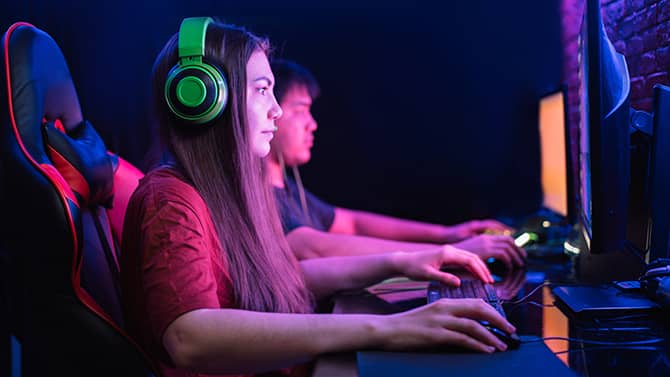Online gaming has emerged as a global phenomenon that transcends entertainment, becoming a laboratory for understanding the psychology of competition and its impact on motivation. As players immerse themselves in virtual battles, challenges, and rankings, the intricate interplay between competition and motivation comes to the forefront. Delving into the world of online gaming opens up exciting possibilities with platforms like ฟัน88. This article explores how online gaming influences motivation, delving into the psychological mechanisms that drive players to excel, persist, and seek mastery within the digital arena.
The Thrill of Challenge
Competition in online gaming introduces challenges that spark a sense of excitement and engagement. The thrill of facing opponents and overcoming obstacles triggers the brain’s reward centers, releasing dopamine—a neurotransmitter associated with pleasure and motivation. This surge of dopamine reinforces players’ motivation to conquer challenges.

Achievement and Goal Setting
Online games often include achievement systems, where players earn rewards for completing specific tasks or reaching milestones. These achievements serve as tangible markers of progress and success, offering a sense of accomplishment that fuels motivation. The pursuit of achievements encourages players to set goals and invest time and effort to achieve them.
Social Comparison and Identity
In the competitive realm of online gaming, players engage in social comparison, evaluating their performance against that of others. This comparison not only drives players to outperform their peers but also shapes their gaming identity. The desire to be recognized as skilled players motivates individuals to invest time honing their abilities.
Mastery and Skill Development
The pursuit of mastery is a powerful driver of motivation in online gaming. As players refine their skills, they experience a sense of progress and growth. This sense of mastery boosts self-confidence and drives players to continue improving—a process known as the “flow” state, where challenges align with skill levels.
Achievement-Seeking Behavior
The achievement-seeking behavior within online gaming mirrors real-world behaviors tied to motivation. Players willingly invest time and effort in practice, adopt strategies, and seek feedback to improve their performance. This behavior aligns with the principles of self-determination theory, where autonomy, competence, and relatedness fuel intrinsic motivation.
Competition and Resilience
Engaging in competitive online gaming fosters resilience in players. The drive to succeed, coupled with the inevitability of occasional setbacks and losses, cultivates the ability to bounce back and persevere. This resilience is transferable to real-world scenarios, demonstrating the positive impact of competitive experiences.
Rewards and Reinforcement
Online gaming integrates various reward mechanisms that reinforce player motivation. Whether through experience points, virtual currency, or cosmetic items, these rewards trigger the brain’s pleasure centers, reinforcing behavior and motivating players to continue playing and competing.
Intrinsic vs. Extrinsic Motivation
Online gaming highlights the interplay between intrinsic and extrinsic motivation. While some players are intrinsically motivated by the joy of competition and skill development, others are extrinsically motivated by external rewards such as rankings or virtual rewards. Balancing both forms of motivation contributes to sustained engagement.
Cognitive Engagement and Skill Transfer
The cognitive engagement required in competitive online gaming translates into improved cognitive abilities, including decision-making, problem-solving, and strategic thinking. These skills can be transferred to real-life situations, enhancing motivation to engage in challenging tasks beyond the digital realm.
The Dark Side of Competition
While competition can be a powerful motivator, it also carries risks. Excessive competition, intense pressure, and toxic behavior within online gaming can lead to burnout, anxiety, and decreased enjoyment. Balancing competition with healthy habits and mindful play is crucial to maintaining positive motivations. Understanding the psychology of competition and online gaming’s impact on motivation is a valuable Source of Knowledge for gamers and researchers interested in the dynamic world of digital gameplay.
Social Bonds and Motivation
Online gaming’s social dimension contributes to motivation. Forming teams, alliances, and friendships fosters a sense of belonging and camaraderie, driving players to participate and perform well to support their in-game community.
Conclusion: Unveiling the Motivational Nexus
Online gaming serves as a captivating arena for unraveling the intricate web of competition and motivation. The interplay between challenges, achievements, identity, and mastery creates a motivational nexus that propels players to excel. As players navigate the virtual landscape of online games, they embark on a journey that mirrors the dynamics of real-world motivation.



